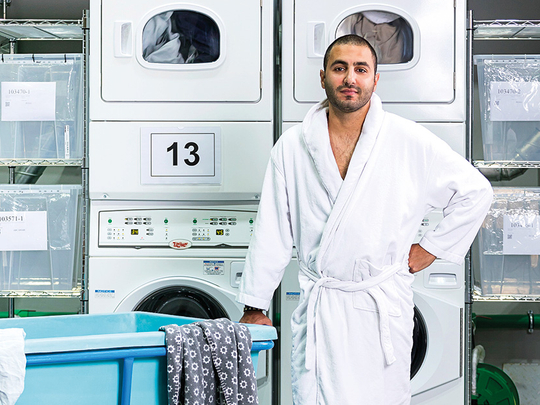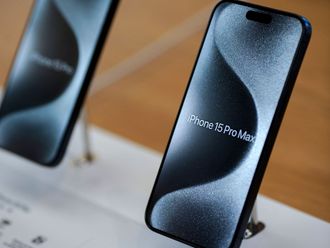
Dubai
The genesis of any start-up is always part fact, part mythologising: A tale that adds to the aura surrounding a company.
For Rami Shaar, it was having to, in his words, ‘recycle’ underwear and socks whilst living as an investment banker, cash rich but time poor.
Working over one hundred hours a week, Shaar said he never had time to do anything himself.
“With time being sensitive, I used to call the laundry service at 10pm, and they would tell me that they were closed,” he said.
When they were open, Shaar would struggle to pay conveniently, with many laundromats only taking cash.
As bad as it sounds, he continued, “I would sometimes have to buy fresh socks and underwear for the day because I just didn’t have time, and other times I would sometimes have to recycle my clothes, including. Recycling socks ... They smell. We’ve all done this.”
The concept, therefore, was to come up with something that was affordable and convenient.
At the time, however, Shaar had no experience in technology or logistics. As a result, the entrepreneur left his career in investment banking and joined Uber in Dubai.
By April 2015, Saudi-born Shaar had been working at the ride-hailing company for a year, and had stock options worth over $1 million.
Unhappy with his new career, Shaar says he often thought about resigning and starting up his own company, but felt tied to Uber by his stock options.
As he explains it, Shaar could only vest, or claim, 25 per cent of his shares every year. He says he couldn’t simply take the $1 million and leave.
Faced with the choice of whether to take the $250,000 and fund his own project, but leave $750,000 on the table, or stay for another three years to claim the full amount, Shaar says he was unsure about what to do.
He eventually decided to leave the company with $250,000, which he would use to start his own company.
Founded shortly after he left Uber, Washmen picks up, cleans and delivers laundry, and the company claims to do so for typically 20-30 per cent less than premium services of its kind tend to charge.
Soon after he launched the service, Shaar found himself being mentored by Careem co-founder Magnus Olsson, which he describes as hugely beneficial.
He says that the idea for the company, which prides itself on being technology-driven, and logistics-oriented, much in the same way that Uber is, came from his time as a banker, and his accompanying laundry woes.
But if Shaar gained his inspiration for the app from his time as a banker, and his operational and technological education whilst at Uber, it was surely the time immediately following his departure from the tech giant that provided him with his passion.
Leaving Uber, and having his judgement questioned by friends and family alike, Shaar said: “You can imagine how ugly that situation was ….It made me look at failure as not an option.”
Whilst estimates vary, a Harvard Business School study suggested that around 75 per cent of venture-backed start-ups would fail, making the threat a very real one for entrepreneurs.
Unfazed by this, Shaar said: “You’ve burnt bridges; you’re really on your own. You’ve only done this because you really believe in yourself. And you believe you can create something much bigger.”
“So for me to look at failure,” he continued, “and this is real emotions I’m talking about right now; between family, between friends, between my spouse, [failure] was just not an option. It puts you in a survival instinct, to really succeed, to really break through any difficulties you might have.”
And Washmen, the app-based laundry delivery service, has had very difficult times according to its founder.
“We’ve had times when we had to firefight,” he said.
Having faced those difficulties, Shaar says that he and his colleagues are very motivated now.
Turning philosophical, Shaar said: “It’s not what Uber taught you, it’s not what investment banking taught you, and it’s not what the corporate world taught you that will make you fight in those difficult times.”
For a start-up to succeed or fail, he added, “it’s those real tests, when you have a problem in your face, when a failure happens, how do you deal with that?”
That was what made a start-up succeed or not, Shaar concluded.
In the early days of Washmen, Shaar identified what he describes as “one of the best laundromats in the world,” which is located in the UAE.
“I went to partner with them. I told them: ‘I do tech and logistics better than you do, I can do branding, customer service, customer acquisition, you do what you do best. Washing,’” he said.
He solved the logistical issue of having a reliable time window for pick up and drop off by simply asking customers to leave their laundry in a provided bag at the door for pick up, and then instructing drivers to leave the bag of fresh laundry at their door when dropping it off.
Surprisingly, according to Shaar, only one bag has ever been mistaken for rubbish in a building’s hallway and thrown away. He says his team was quickly able to locate it, and retrieve the clothes.
“Over 80 per cent of our pick ups and drop offs are at the door now. At the beginning, it was 15 per cent,” Shaar said.
Washmen has introduced a number of new products to entice would-be launderers, such as a Dh49 all-you-can-wash bag.
Shaar argued that the prevailing logic was that people wouldn’t want to give gym clothes, underwear, and towels, that instead they would split that and do it at home themselves.
“We saw an opportunity to gain the full laundry basket by introducing the wash and fold,” he said.
At Dh49 for as much laundry as you can stick in to a bag, the company’s argues that it is affordable. Shaar says it took him a long time to get the price down to that level: “It used to be Dh79, but by building our facility, and investing in to the operations, and coming up with a scalable operation, we’ve been able to drop the price. We are more profitable now at Dh49 than we were at Dh79.”
He says that the company saw a 90 per cent lift in orders of this product after dropping the price.
Introducing new, innovative products to attract younger, tech-savvy customers appears to be paying dividends.
The company closed a $400,000 seed funding in 2015, and recently closed a major round of series A funding, although Shaar declined to specify the amount Washmen had received.
In previous interviews, the founder has said that the company was already operationally profitable.
According to Shaar, by getting in to the “everyday laundry market” through the Dh49 bags, Washmen can “capture a whole additional share that nobody really competes on.”
Overall profitability is within reach, he added.
“If we want to become cash flow positive tomorrow, we can do so,” Shaar has said previously.
Competing for a slice of the UAE’s Dh2 billion laundry market, Washmen are vying for a share with similar start-ups such as Laundrybox.
Name: Washmen
Sector: Laundry — Tech
Years Founded: 2015
Founders: Rami Shaar and Jad Halaoui
Funding: $400,000 seed fund
Employees: 27










